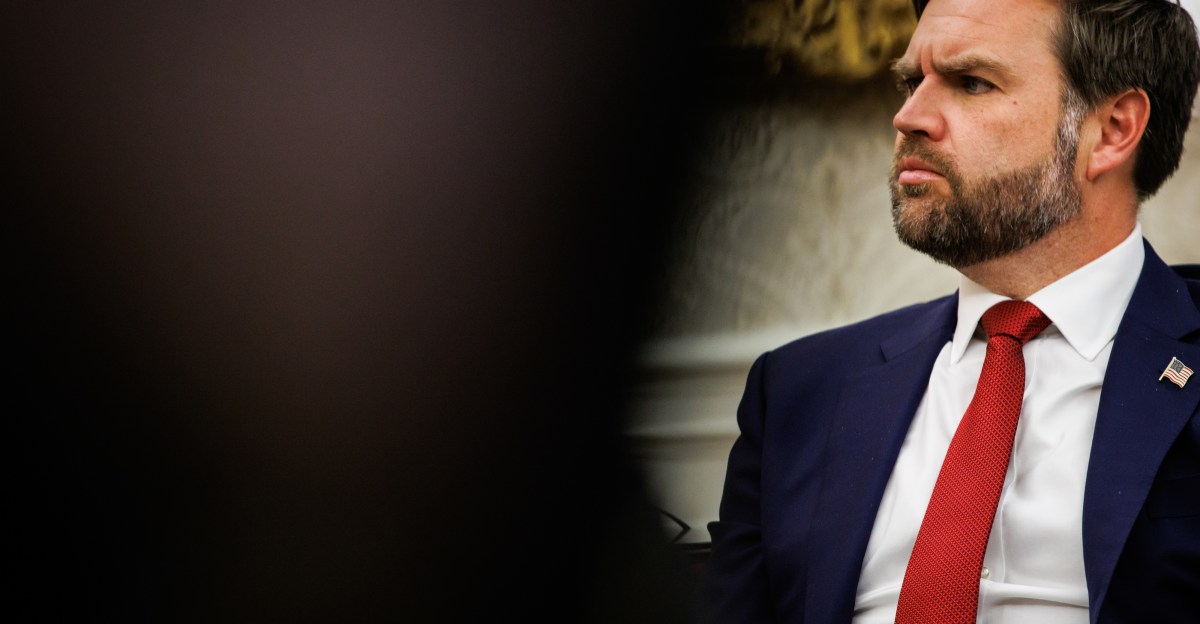Politics
Young Republicans’ Group Chat Sparks Debate on Antisemitism

Recent revelations from a leaked group chat among members of the Young Republicans have ignited a significant conversation regarding antisemitism within the American conservative movement. The chat, reported by Politico, included derogatory remarks directed at internal rivals, with one participant referring to a colleague as a “fat stinky Jew” and others making light of sending rivals “to the gas chamber.” Such language has raised questions about the normalization of antisemitic rhetoric among young conservatives.
The group chat’s contents have prompted varied responses from prominent figures on the right. Vice President JD Vance dismissed the controversy as mere “pearl clutching” over a “college group chat,” portraying the participants as “kids” and downplaying the gravity of their remarks. This stance aligns with Vance’s broader strategy of supporting controversial figures within the conservative movement, even if their statements provoke backlash.
In contrast, some conservatives, including Seth Dillon, founder of the Babylon Bee, have criticized the lack of accountability among right-wing leaders regarding antisemitic sentiments. Dillon suggested that failing to denounce such comments effectively enables the behavior. The debate centers not only on the specific comments made in the chat but also on a perceived trend of growing antisemitism and racism among young conservatives, as noted by various commentators and analysts.
Conservative Concerns and Cultural Trends
Historically, antisemitism has lingered in certain corners of the right, often surfacing in online platforms like 4chan. The infamous rally in Charlottesville in 2017 marked a public emergence of such views, where white supremacists chanted “Jews will not replace us.” Despite this, many mainstream conservative figures have largely distanced themselves from overtly antisemitic rhetoric.
However, recent commentary highlights a troubling trend, with individuals like Christopher Rufo warning that ideas previously considered fringe—such as racialism and conspiracism—are increasingly permeating mainstream conservatism. Rufo noted that young GOP staffers have acknowledged the growing acceptance of these views among their colleagues, suggesting that a culture is developing where extreme statements are celebrated rather than condemned.
In a related discussion, right-leaning commentator Richard Hanania introduced the concept of the “Based Ritual,” where young conservatives compete to express increasingly outrageous views on social issues. This phenomenon reflects a shift in the conservative landscape, where incendiary remarks about race, gender, and identity are no longer strictly taboo but rather seen as a means of gaining social capital within certain circles.
Public Reaction and Implications
The discourse surrounding the leaked chat has revealed deep divisions within conservative circles. Prominent figures are grappling with the implications of these sentiments, particularly in light of the recent killing of conservative influencer Charlie Kirk. Although evidence suggests Kirk was murdered by a lone assailant, conspiracy theories have quickly circulated, with some suggesting that Jewish interests were involved in orchestrating his death due to his evolving views on Israel.
Kirk had long maintained a pro-Israel stance, but tensions had emerged as the right became increasingly divided over the issue, particularly during the ongoing Gaza conflict. His frustration with financial pressures from donors led to internal conflicts, further complicating the narrative following his tragic death. At his memorial service, discussions surrounding the motivations for his killing continued to fuel speculation and conspiracy theories, including insinuations that it was a result of his perceived betrayal of pro-Israel sentiments.
As the conversation continues, there are growing calls among some conservatives to address the antisemitic undercurrents more proactively. Figures like Ben Shapiro acknowledge the presence of troubling rhetoric on the right and emphasize the importance of confronting these issues. Yet, others, such as Matt Walsh, express concern that such discussions may detract from the broader goal of uniting against perceived leftist threats.
The challenge moving forward lies in balancing the need for unity within the conservative movement while addressing the unsettling rise of antisemitic and extremist rhetoric. As discussions evolve, many are left questioning how to draw the line between acceptable discourse and harmful ideology. The leaked chat serves as a stark reminder of the ongoing struggle within the right to confront its more extremist elements while navigating the complexities of coalition-building in a divided political landscape.
The responses to these events may shape the future of the conservative movement as it grapples with its identity and the values it chooses to uphold.
-

 Science2 weeks ago
Science2 weeks agoIROS 2025 to Showcase Cutting-Edge Robotics Innovations in China
-

 Politics2 weeks ago
Politics2 weeks agoJudge Considers Dismissal of Chelsea Housing Case Citing AI Flaws
-

 World2 weeks ago
World2 weeks agoBravo Company Veterans Honored with Bronze Medals After 56 Years
-

 Lifestyle2 weeks ago
Lifestyle2 weeks agoStone Island’s Logo Worn by Extremists Sparks Brand Dilemma
-

 Health2 weeks ago
Health2 weeks agoStartup Liberate Bio Secures $31 Million for Next-Gen Therapies
-

 Top Stories2 weeks ago
Top Stories2 weeks agoIndonesia Suspends 27,000 Bank Accounts in Online Gambling Crackdown
-

 Sports2 weeks ago
Sports2 weeks agoMel Kiper Jr. Reveals Top 25 Prospects for 2026 NFL Draft
-

 Health2 weeks ago
Health2 weeks agoTop Hyaluronic Acid Serums for Radiant Skin in 2025
-

 World2 weeks ago
World2 weeks agoHoneywell Predicts Record Demand for Business Jets Over Next Decade
-

 Sports2 weeks ago
Sports2 weeks agoYamamoto’s Mastery Leads Dodgers to 5-1 Victory in NLCS Game 2
-

 Politics2 weeks ago
Politics2 weeks agoNew Jersey Voters Urged to Register Ahead of November Election
-

 Lifestyle2 weeks ago
Lifestyle2 weeks agoMary Morgan Jackson Crowned Little Miss National Peanut Festival 2025









